英语介绍人身体部位及相关习语
介绍身体部位英文作文初一
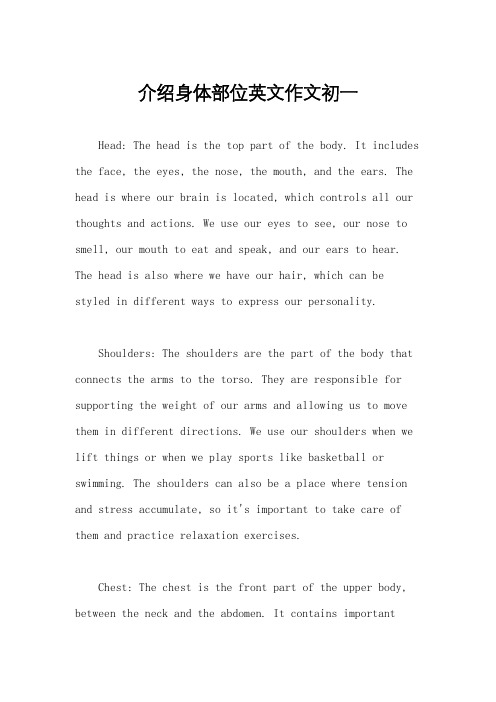
介绍身体部位英文作文初一Head: The head is the top part of the body. It includes the face, the eyes, the nose, the mouth, and the ears. The head is where our brain is located, which controls all our thoughts and actions. We use our eyes to see, our nose to smell, our mouth to eat and speak, and our ears to hear. The head is also where we have our hair, which can be styled in different ways to express our personality.Shoulders: The shoulders are the part of the body that connects the arms to the torso. They are responsible for supporting the weight of our arms and allowing us to move them in different directions. We use our shoulders when we lift things or when we play sports like basketball or swimming. The shoulders can also be a place where tension and stress accumulate, so it's important to take care of them and practice relaxation exercises.Chest: The chest is the front part of the upper body, between the neck and the abdomen. It contains importantorgans like the heart and the lungs. The chest expands and contracts when we breathe, allowing air to enter and leave our lungs. It is also a symbol of strength and power, as it houses our heart, which pumps blood to the rest of our body. In some cultures, the chest is seen as a sign of attractiveness and is often emphasized with clothing or accessories.Arms: The arms are the upper limbs of the body,attached to the shoulders. They are used for various activities, such as reaching, grabbing, and lifting. We use our arms to carry things, to hug our loved ones, and to express ourselves through gestures. The arms are also a common place for tattoos, which can be a form of self-expression or a way to commemorate important events or people in our lives.Legs: The legs are the lower limbs of the body,attached to the hips. They are responsible for supporting our weight and helping us move from one place to another. We use our legs for walking, running, jumping, and dancing. The legs are made up of different parts, including thethighs, the knees, the calves, and the feet. Each part has its own function and contributes to our overall mobility and balance.Feet: The feet are the lowest part of the body, attached to the legs. They are responsible for carrying our weight and helping us maintain balance. Our feet have many small bones and muscles that work together to allow us to walk and stand. They also have sensory receptors that help us feel the ground beneath us. Taking care of our feet is important, as they can be prone to problems like blisters, calluses, and foot pain.Overall, our body is a complex and amazing machine. Each part has its own unique function and contributes to our overall well-being and ability to interact with the world around us. It's important to take care of our body and appreciate all the incredible things it can do.。
最新身体部位英语习语50句
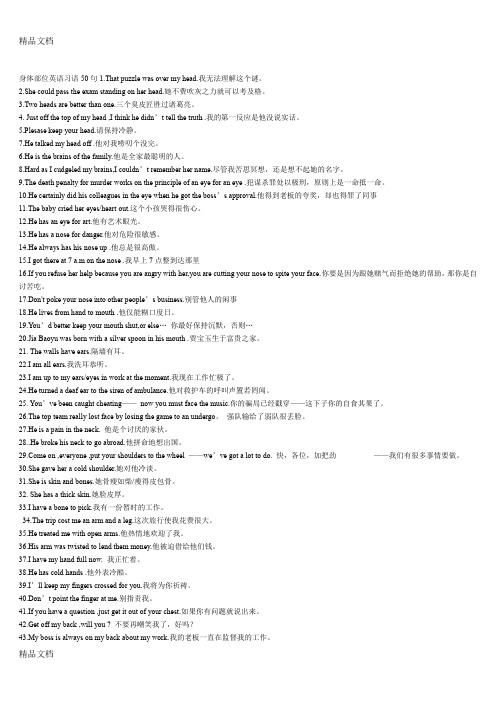
身体部位英语习语50句1.That puzzle was over my head.我无法理解这个谜。
2.She could pass the exam standing on her head.她不费吹灰之力就可以考及格。
3.Two heads are better than one.三个臭皮匠胜过诸葛亮。
4. Just off the top of my head ,I think he didn’t tell the truth .我的第一反应是他没说实话。
5.Plesase keep your head.请保持冷静。
7.He talked my head off .他对我唠叨个没完。
6.He is the brains of the family.他是全家最聪明的人。
8.Hard as I cudgeled my brains,I couldn’t remember her name.尽管我苦思冥想,还是想不起她的名字。
9.The death penalty for murder works on the principle of an eye for an eye .犯谋杀罪处以极刑,原则上是一命抵一命。
10.He certainly did his colleagues in the eye when he got the boss’s approval.他得到老板的夸奖,却也得罪了同事11.The baby cried her eyes/heart out.这个小孩哭得很伤心。
12.He has an eye for art.他有艺术眼光。
13.He has a nose for danger.他对危险很敏感。
14.He always has his nose up .他总是很高傲。
15.I got there at 7 a.m on the nose .我早上7点整到达那里16.If you refuse her help because you are angry with her,you are cutting your nose to spite your face.你要是因为跟她赌气而拒绝她的帮助,那你是自讨苦吃。
有关人体身体部位的英文谚语习语
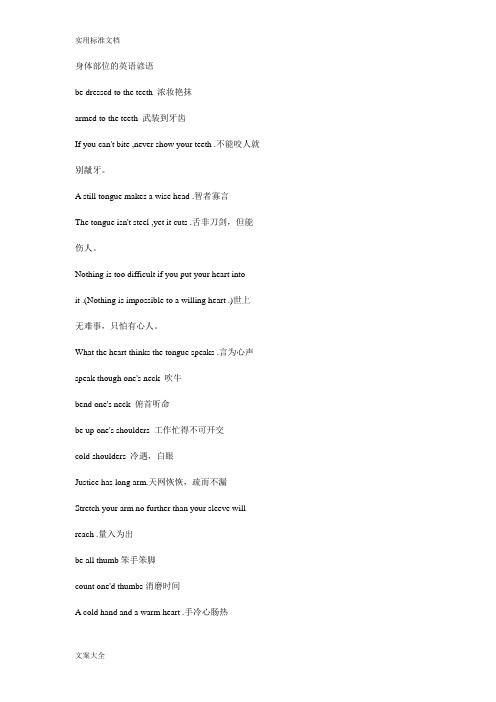
Nothing is too difficult if you put your heart into
it .(Nothing is impossible to a willing heart .)世上
无难事,只怕有心人。
What the heart thinks the tongue speaks .言为心声
A close mouth catches no flies.[谚语]口紧不招祸。
Keep your mouth shut and your eyes open.[谚语]多看少
说
An apple a day keeps doctor away.一天一个苹果,医生
不来找。
Nothing is too diffcult,if you put your heart into
Two heads are better than one.[谚]三个臭皮匠,赛过诸
葛亮。
Hair头发
Hang by a hair千钧一发;岌岌可危;摇摇欲坠。
Take a hair of the dog that bit you.以毒攻毒;以酒解
毒。
Eye眼;目
Better to have one eye than be blind altogether.[谚
A wise head makes a close mouth智者缄言
A wise head makes the tongue short .智者寡言。
A wise man will make tools of what comes to hand .智
者自决,愚者从众。
Walls have ears隔墙有耳a fresh hand新手
身体各部位介绍英语作文

身体各部位介绍英语作文Title: Introduction to Various Parts of the Human Body。
The human body is a complex and fascinating organism composed of various interconnected parts, each with its unique structure and function. In this essay, we will delve into the intricacies of different body parts, exploringtheir roles and significance in maintaining overall health and functionality.1. The Brain: Often referred to as the command centerof the body, the brain controls all voluntary andinvoluntary actions. It processes sensory information, enables thinking, learning, and emotions, and regulatesvital functions such as heartbeat and breathing.2. The Heart: This muscular organ is responsible for pumping oxygen-rich blood throughout the body via a network of blood vessels. It ensures that all cells receive the nutrients and oxygen they need to function properly.3. The Lungs: Vital for the respiratory system, the lungs facilitate the exchange of oxygen and carbon dioxide between the air we breathe and the bloodstream. Through inhalation and exhalation, they help maintain the body's acid-base balance and support cellular metabolism.4. The Liver: Acting as the body's detoxifier, theliver filters toxins from the blood, metabolizes nutrients, and produces bile, which aids in digestion. It also stores essential vitamins and minerals and plays a crucial role in regulating blood sugar levels.5. The Kidneys: These bean-shaped organs filter waste products and excess fluids from the blood to form urine, which is excreted from the body. They also help maintain electrolyte balance, regulate blood pressure, and stimulate the production of red blood cells.6. The Skin: The body's largest organ, the skin serves as a protective barrier against pathogens, UV radiation, and physical injury. It regulates body temperature,prevents dehydration, and houses sensory receptors for touch, temperature, and pain.7. The Muscles: Comprising over 600 muscles, the muscular system enables movement, supports posture, and generates heat to maintain body temperature. Skeletal muscles are under voluntary control, while smooth and cardiac muscles function involuntarily.8. The Bones: Providing structural support and protection for internal organs, bones form the framework of the body. They also produce red and white blood cells, store minerals like calcium and phosphorus, and facilitate movement by anchoring muscles.9. The Digestive System: Consisting of organs such as the stomach, intestines, liver, and pancreas, this system processes food, extracts nutrients, and eliminates waste. It involves mechanical and chemical digestion, absorption of nutrients, and the production of digestive enzymes and hormones.10. The Endocrine System: Comprising glands such as the pituitary, thyroid, and adrenal glands, this system regulates various bodily functions through the secretion of hormones. These chemical messengers control metabolism, growth, reproduction, and response to stress.11. The Immune System: A complex network of cells, tissues, and organs, the immune system defends the body against pathogens, foreign invaders, and abnormal cells. It includes white blood cells, antibodies, and lymphoid organs like the thymus and spleen.12. The Nervous System: Along with the brain and spinal cord, this system coordinates the body's responses to internal and external stimuli. It transmits electrical signals through neurons, allowing for sensation, movement, and communication between different body parts.In conclusion, the human body is a marvel of biological engineering, with each part playing a crucial role in maintaining overall health and functionality. Understandingthe structure and function of these body parts is essential for promoting well-being and preventing disease.。
最新有关身体部位的英语习语
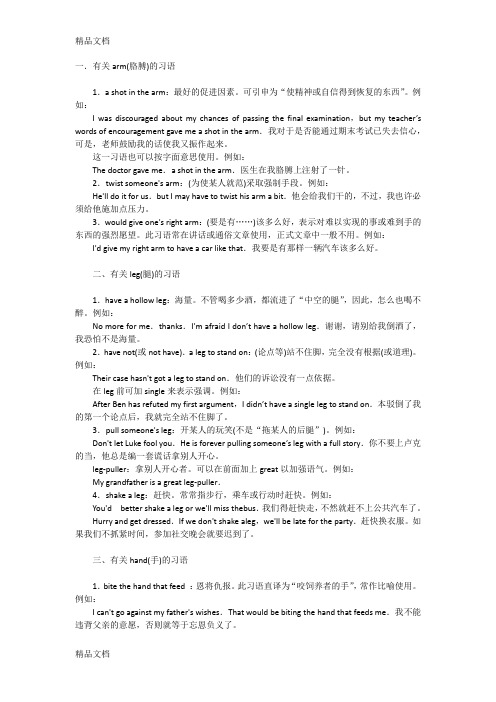
一.有关arm(胳膊)的习语1.a shot in the arm:最好的促进因素。
可引申为“使精神或自信得到恢复的东西”。
例如:I was discouraged about my chances of passing the final examination,but my teacher’s words of encouragement gave me a shot in the arm.我对于是否能通过期末考试已失去信心,可是,老师鼓励我的话使我又振作起来。
这一习语也可以按字面意思使用。
例如:The doctor gave me.a shot in the arm.医生在我胳膊上注射了一针。
2.twist someone's arm:(为使某人就范)采取强制手段。
例如:He'll do it for us.but I may have to twist his arm a bit.他会给我们干的,不过,我也许必须给他施加点压力。
3.would give one's right arm:(要是有……)该多么好,表示对难以实现的事或难到手的东西的强烈愿望。
此习语常在讲话或通俗文章使用,正式文章中一般不用。
例如:I'd give my right arm to have a car like that.我要是有那样一辆汽车该多么好。
二、有关leg(腿)的习语1.have a hollow leg:海量。
不管喝多少酒,都流进了“中空的腿”,因此,怎么也喝不醉。
例如:No more for me.thanks.I'm afraid I don’t have a hollow leg.谢谢,请别给我倒酒了,我恐怕不是海量。
2.have not(或not have).a leg to stand on:(论点等)站不住脚,完全没有根据(或道理)。
例如:Their case hasn't got a leg to stand on.他们的诉讼没有一点依据。
关于人体部位的英语习语
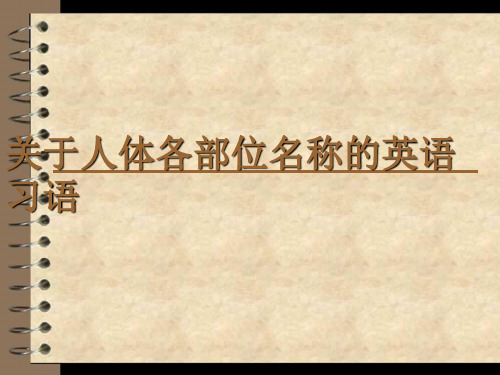
5、内涵丰富,不易理解 To turn the other cheek to sb 对某人宽容大 度 To cool one’s heels 等待休息 6、借助人体机能,激发自然联想 Head and brain 头脑,常与思考联系在一起 Nose 鼻子状的东西,与观察干预侦查联系 在一起
Eye 眼与看、注视、或看到的事物联 系 Ear 耳朵 与听联系 Mouth lips teeth tongue throat gums 发 音器官 与说联系 Heart 心常与认得整体性格,特别是 直觉、情感、精神、勇气、宽厚 或热情联系
4、具有鲜明的名族特色和地方色彩 英国用keep one’s head above water 不背债, 免遭灭顶 To be up to (one’s) ear in debt 深陷债务 To have one’s head screwed on the right way 有头脑,机智的(英国是工业国家, 把人体当成机器。)
有关eye的英语习语 Be up to your eyes in sth 忙于;深陷于; An eye for an eye 以牙还牙 For sb’s eye only 只供某人读或看
Have an eye for sth 对……有鉴赏力 Have an eye on sth 做另一件事得同时(悄悄)注意 Have eyes in your back of your head 脑后长眼;眼光敏锐
othercheeksb对某人宽容大coolonesheels等待休息6借助人体机能激发自然联想headbrain头脑常与思考联系在一起nose鼻子状的东西与观察干预侦查联系在一起eye眼与看注视或看到的事物联ear耳朵与听联系mouthlipsteethtonguethroatgums音器官与说联系heart心常与认得整体性格特别是直觉情感精神勇气宽厚或热情联系hand手使人联想到雇员有技术和有力量的人finger手指头与行事指示捞好处相联stomach胃胃口愿望意向相联系blood血与生命活力勇气相联系bone骨头与本质骨子相联系flesh肌肉与力量相联系nerves神经与感情情绪相联系gall胆汁厚颜无耻的guts内脏与勇气耐力忍耐相联系legfootheel与行走立足立场理据相联系有关head的英语习惯用语bangknockyourtheirheadstogether强行制止人们争吵并使之回复理智bangingyourheadagainstbrickwall用头撞墙
【优质】小学英语人教PEP版三年级上册人体部位和习语 二
人体部位和英语习语(二)1. StomachThe stomach is naturally related to one's appetite. If you dislike heavy food, you have no stomach for it (反胃). The word is also related to one's interests or likings. If you find something boring or vulgar, you have no stomach for it, either. Bad food turns your stomach. Similarly, your stomach turns at a bad joke.Stomach can also be a verb. Look at this example: "How could you stomach (忍受) such rude words?"Apparently, stomach here can be replaced by "tolerate".2. ArmEvery person has two arms: the right arm and the left arm. The right arm is usually stronger, so we call a good helper the right arm (得力助手).We all know an arm is not very long. But when you keep someone at arm's length (保持距离), the distance is long enough. For that means you do not like that person and you try your best to avoid him or her. We should indeed keep the bad friends at arm's length.3. HandQuite a number of phrases formed form the word hand are very similar to their Chinese counterparts. Here are some obvious examples: a fresh hand (新手), short of hands (人手短缺), hand in hand (手拉手) and wash one's hands of something (洗手不干了). But do not always take this for granted. Study these examples and you will understand.He lives from hand to mouth (He has just enough money to live on). We gave them a big hand (We gave them lots of applause.).4. FingerHow many fingers does each of your hands have? Now let's name them in English from the smallest: the little finger, the ring finger, the middle finger, the index finger and thumb.Each finger has its own part to play. If your fingers are all thumbs (笨拙), that is too bad. That means you are very clumsy.5. ThumbChinese people turn up their thumbs to express appreciation. English peopled so to express not only appreciation but also approval. Chinese people never turn their thumbs down to mean anything. But English people do.They do so to show depreciation or disapproval. Thus in English you can say, "We turn thumbs up (赞成) to Jack's suggestion but they turn thumbs down (不赞成) to it." Similarly, you can warmly praise someone by saying "Thumbs up (真棒)!" and show your dissatisfaction by saying "Thumbs down (差劲)!"6. NailIf you see two of your classmates fighting tooth and nail (又抓又咬), you must stop them at once. Otherwise, at least one of them would be hurt.Nail also means a thin pointed piece of metal for hammering into something.But it is related to the body in this sentence: "Peter is as hard as nails (结实的像铁打的)."We all hope that we are as strong and healthy as he is.Then if I say you have hit the nail on the head (中肯,一针见血), I do not mean that you have done something cruel.I mean that you have said exactly the right thing.7. LegThe word leg appears in many colloquial expressions. At a party, when you feel like dancing, you can say to a good friend of yours, "Let's shake a leg." Obviously, it means"Let's dance." When you want your fiend to hurry, you can also "shake a leg". In American English it means "hurry".The arms and legs are very important to us. Therefore when asked why you are not going to buy something expensive, you may answer, "It costs an arm and a leg!" You mean that it is really expensive. If you pull one's leg, it means you make fun of someone.8. ToeTo convey the idea "from head to foot", English people can say from top to toe. But Chinese people don't.Some people turn their toes out (八字脚) when they walk. Some turn their toes in.When faced with danger, we must be alert and ready for action, that is to say, we must be on our toes (保持警惕).9. SkinHuman beings have skin. So have animals and plants. The skin can be thick or thin. A think-skinned person, or a person who has a thin skin, is easily upset or offended while a thick-skinned person, or a person who has a thick skin, is quite the contrary. Both expressions are sometimes derogatory (贬义).That is to say, sometimes the former refers to a personwho is too sensitive; the latter a person who has little sense of shame.10. HairMost people will only think of the hair on our head when the word hair is mentioned. In fact, some animals and plants also have hair.A horrible scene may make a person's hair stand on end (毛骨悚然). But a courageous person will not turn a hair (不畏惧) even though he is in face of danger.Sometimes, a friend of yours may be so angry that he may act foolishly. Then you had better give him this advice: "Keep your hair on (别发脾气)".。
人物身体部位英语作文
人物身体部位英语作文Title: The Human Body。
Introduction:The human body is a complex and fascinating structure composed of various organs, systems, and parts. Each body part plays a crucial role in maintaining our overall health and well-being. In this essay, we will explore some of the major body parts and their functions.Head and Neck:The head is the uppermost part of the human body, housing the brain, eyes, nose, mouth, and ears. The brain acts as the control center, coordinating all bodily functions. The eyes enable us to see the world around us, while the nose allows us to smell different scents. The mouth is responsible for eating, drinking, and speaking, while the ears help us hear sounds.Chest and Abdomen:The chest consists of the ribcage, which protects vital organs such as the heart and lungs. The heart pumps blood throughout the body, supplying oxygen and nutrients. The lungs enable us to breathe by taking in oxygen andexpelling carbon dioxide. The abdomen contains organs like the stomach, liver, and intestines, which aid in digestion and nutrient absorption.Arms and Hands:The arms are attached to the shoulders and consist of the upper arm, forearm, and hand. They allow us to perform various tasks, such as lifting, carrying, and manipulating objects. The hands, with their intricate structure of bones and joints, enable us to grasp and manipulate objects with precision.Legs and Feet:The legs support the body's weight and allow us to walk, run, and perform other physical activities. They consist of the upper leg, lower leg, and foot. The feet, with their numerous bones and muscles, provide stability and balance while walking or standing.Skin:The skin is the largest organ of the human body andacts as a protective barrier against external factors. It regulates body temperature, prevents water loss, and houses sensory receptors that allow us to feel touch, pressure,and pain.Skeletal System:The skeletal system is composed of bones, which provide support, protection, and structure to the body. It also plays a vital role in producing blood cells and storing minerals.Muscular System:The muscular system consists of muscles that enable movement by contracting and relaxing. It allows us to perform various activities, from simple tasks like writing to complex movements like running or dancing.Nervous System:The nervous system includes the brain, spinal cord, and nerves. It coordinates and controls all bodily functions, allowing us to think, feel, and respond to stimuli.Conclusion:The human body is a remarkable creation, with each body part contributing to its overall functionality. Understanding the functions of different body parts helps us appreciate the complexity and interconnectedness of our physical being. Taking care of our bodies through a healthy lifestyle and regular medical check-ups ensures optimal functioning and longevity.。
课外补充:人体部位英语谚语
课外补充:人体部位英语谚语在我们中国有“失之交臂”、“交头接耳”、“一时失足”等与人体部位有关的成语、谚语。
在英语中也有许多关于人体部位的习语、谚语。
下面就“从头到脚”开始学起。
1.head 头Two heads are better than one.两人智慧胜一人。
(三个臭皮匠,赛过诸葛亮。
)Better be the head of an ass than the tail of a horse.宁为鸡头,不当凤尾。
2.hair头发Take a hair of the dog that bit you.以毒攻毒;以酒解酒。
3.eye眼;目Four eyes see more than two .两个人总比一个人看得全面。
4.face脸;面孔A good fame is better than a good face.美名胜过美貌。
A good face is a letter of recommendation .漂亮的脸蛋就是最好的介绍信。
5.nose鼻子See no further than one’s nose.鼠目寸光。
6.mouth 嘴;口Keep your mouth shut and your eyes open.多看少说。
7.tooth 牙齿Be dressed to the teeth.浓妆艳抹。
8.heart心;心脏Nothing is too difficult if you put your heart into it.世上无难事,只怕有心人。
9.arm臂,胳膊Justice has long arms.天网恢恢,疏而不漏。
10.hand 手One hand washes another.有来有往,互相利用。
11.leg腿;腿部Fall on your leg.逢凶化吉。
12.foot 脚,足Have a foot in both camps.脚踏两只船。
Better the foot slip than the tongue.宁可失足,不可失言。
学习用表达身体部位
学习用表达身体部位在学习一门外语时,掌握身体部位的表达是非常重要的一部分。
无论是在日常生活中与人交流,还是在医疗、健康等领域,我们都需要准确地描述身体的不同部位。
本文将介绍一些常用的身体部位表达方式,并提供一些实用的例句以供参考。
1. 头部(Head)头部是人体最上方的部分,包括头发、脸颊、眼睛、耳朵等。
头发(Hair)- My hair is blonde.(我的头发是金色的。
)- She has long curly hair.(她有长卷发。
)脸颊(Cheek)- He has rosy cheeks.(他的脸颊红润。
)- She kissed his cheek gently.(她轻轻地吻了他的脸颊。
)眼睛(Eyes)- His eyes are blue.(他的眼睛是蓝色的。
)- She blinked her eyes in surprise.(她惊讶地眨了眨眼睛。
)耳朵(Ears)- His ears are pierced.(他的耳朵上有耳洞。
)- She covered her ears to block out the noise.(她捂住耳朵以阻止噪音。
)2. 上半身(Upper Body)上半身是指从头到腰部的部分,包括颈部、肩膀、胸部和背部等。
颈部(Neck)- She wore a necklace around her neck.(她戴着一条项链在她的脖子上。
)- He massaged his stiff neck.(他按摩了一下僵硬的脖子。
)肩膀(Shoulders)- Her shoulders are broad.(她的肩膀宽阔。
)- He shrugged his shoulders.(他耸了耸肩。
)胸部(Chest)- He has a muscular chest.(他有一块肌肉发达的胸肌。
)- She placed her hand on her chest, feeling her heart pounding.(她把手放在胸口,感受到自己的心脏怦怦直跳。
- 1、下载文档前请自行甄别文档内容的完整性,平台不提供额外的编辑、内容补充、找答案等附加服务。
- 2、"仅部分预览"的文档,不可在线预览部分如存在完整性等问题,可反馈申请退款(可完整预览的文档不适用该条件!)。
- 3、如文档侵犯您的权益,请联系客服反馈,我们会尽快为您处理(人工客服工作时间:9:00-18:30)。
人体部位和英语习语1. HeadThe head is thought to be the most important part of the human body. So a leader is often compared to a head (首脑). Thus we have Head of State or the head of a delegation.The head is where the brain is located. It is naturally associated with ideas and intelligence. Very often, we need other people's ideas and opinions when we want to do something well. The is because two heads are better than one (三个臭皮匠顶个诸葛亮).2. EyeThe eyes are extremely precious to us. That is why we say" Mind your eye (当心)! when we reminding someone to be careful.Not only human beings and animals have eyes, many things also have" eyes" the eyes of a ship, the eye of a needle, the eye of a typhoon, and so on.3. EarThe ear is the organ of hearing. A piece of light music is easy on the ear. (悦耳动听). We are usually all ears (专心聆听) for bit news.When they think somebody is overhearing, English people use either of the two proverbs: Walls have ears (隔墙有耳) and Pitchers have ears (壶罐有耳). They also think that little pitchers have big ears(小孩子耳朵尖). Nice boys and girls respect other people. They will not secretly listen to others' private conversations.4. NoseThe English phrase "face to face (面对面)" and its Chinese counterpart(对应) are exactly the same. But English people, to express the same idea, can say nose to nose instead. There is no such substitute in Chinese.The word nose appears in many idioms. Here are two which are quite similar to their Chinese equivalents: lead somebody by the nose (牵着某人的鼻子走) and turn up one's nose atsomebody or something (对某人或某物嗤之一鼻).English people can say as plain as the nose in one's face (一清二楚) to mean "very obvious". May be to them, the nose is the most conspicuous part of the face.5. LipWe have two lips: the upper lip and the lower lip. If one's two lips are closed, one cannot speak. So it goes without saying that "don't open your lips (不要开口)" means "don't speak".His lips are sealed. Are his lips really stuck together by wax or glue? No, his lips are sealed when asked about something that he must keep secret. Sometimes a top secret is betrayed because it has escaped someone's lips (脱口而出). Then the incident may become a piece of news that is on everybody's lips (众口相传).6. TongueWe all know we cannot speak without the tongue. So the tongue is closely related to speech. To hold one's tongue (保持沉默) means "to keep silent". A person who has too much tongue (太多嘴) is disliked by all, for he is too talkative. Mother tongue is not the tongue of a mother: it is a person's native language."Don't you have a moth below your nose (你鼻子底下不是有张嘴吗)?" The Chinese say so to blame a person who did not say what he should have said. But this not the right way to express the idea in English. English people would say, "You have a tongue in your head, haven't you?"7. FaceFace has to do with the idea of respect and dignity both in Chinese and English. You lose your face (丢面子) if you fail again and again, but a decisive victory will save your face (挽回面子) after all your failures.When you feel unhappy, you pull a long face (拉长脸). The idea is conveyed in Chinese in the same way. But "about face (向后转)" does not refer to the face. It is a military order to turn round and face in the opposite direction. It is the exact equivalent of " about turn".8. ShoulderThe shoulders can bear heavy things. Your father has a great responsibility for the family on his shoulder. When faced with difficulty, the family should stand shoulder to shoulder (肩并肩) to overcome it. You should not turn a cold shoulder (不理睬) to your family members. Nor should you give your friends the cold shoulder (冷落朋友). Both expressions mean treating others coldly.9. BackA good host is hospitable to his guests. But, if guest is tiresome, the host is glad to see his back (他离开).If your friend has done something really well, you may give him a pat on the back (轻轻拍背部) to show your appreciation.If you turn your back on somebody (不理睬他人), you mean you do not like making friends with that person.10. HeartThe heart is an extremely important organ inside the chest. It usually stands for something important or the centre of something, for example, the heart of the matter (问题的核心) or the heart of mystery.Many other expressions make use of the word heart. A lover can be called a sweet heart (情人). The Purple Heart (紫心徽章) is a medal given as an honor to American soldiers wounded in battle.If your friend is in trouble, you may encourage him by saying "Don't lose heart (不要灰心)."11. StomachThe stomach is naturally related to one's appetite. If you dislike heavy food, you have no stomach for it (反胃). The word is also related to one's interests or likings. If you find something boring or vulgar, you have no stomach for it, either. Bad food turns your stomach. Similarly, your stomach turns at a bad joke.Stomach can also be a verb. Look at this example: "How could you stomach (忍受) such rude words?" Apparently, stomach here can be replaced by "tolerate".12. ArmEvery person has two arms: the right arm and the left arm. The right arm is usually stronger, so we call a good helper the right arm (得力助手).We all know an arm is not very long. But when you keep someone at arm's length (保持距离), the distance is long enough. For that means you don not like that person and you try your best to avoid him or her. We should indeed keep the bad friends at arm's length.13. HandQuite a number of phrases formed form the word hand are very similar to their Chinese counterparts. Here are some obvious examples: a fresh hand (新手), short of hands (人手短缺), hand in hand (手拉手) and wash one's hands of something (洗手不干了). But do not always take this for granted. Study these examples and you will understand.He lives from hand to mouth (He has just enough money to live on). We gave them a big hand (We gave them lots of applause).14. FingerHow many fingers does each of your hands have? Now let's name them in English from the smallest: the little finger, the ring finger, the middle finger, the index finger and thumb.Each finger has its own part to play. If your fingers are all thumbs (笨拙), that is too bad. That means you are very clumsy.15. ThumbChinese people turn up their thumbs to express appreciation. English people do so to express not only appreciation but also approval. Chinese people never turn their thumbs down to mean anything. But English people do. They do so to show depreciation disapproval. Thus in English you can say, "We turn thumbs up (赞成) to Jack's suggestion but they turn thumbs down (不赞成) to it."Similarly, you can warmly praise someone by saying "Thumbs up (真棒)!" and show your dissatisfaction by saying "Thumbs down (差劲)!"16. NailIf you see two of your classmates fighting tooth and nail (又抓又咬), you must stop them at once. Otherwise, at least one of them would be hurt.Nail also means a thin pointed piece of metal for hammering into something. But it is related to the body in this sentence: "Peter is as hard as nails (结实的象铁打的)." We all hope that we are as strong and healthy as he is.Then if I say you have hit the nail on the head (中肯,一针见血), I don not mean that you have done something cruel. I mean that you have said exactly the right thing.17. LegThe word leg appears in many colloquial expressions. At a party, when you feel like dancing, you can say to a good friend of yours, "Let's shake a leg." Obviously, it means " Let's dance." When you want your fiend to hurry, you can also "shake a leg". In American English it means "hurry".The arms and legs are very important to us. Therefore when asked why you are not going tobuy something expensive, you may answer, "It costs an arm and a leg!" You mean that it is really expensive. If you pull one's leg, it means you make fun of someone.18. ToeTo convey the idea "from head to foot", English people san say from top to toe. But Chinese people don't.Some people turn their toes out (八字脚) when they walk. Some turn their toes in.When faced with danger, we must be alert and ready for action, that is to say, we must be on our toes (保持警惕).19. SkinHuman beings have skin. So have animals and plants. The skin can be think or thin. Athink-skinned person, or a person who has a thin skin, is easily upset or offended while a thick-skinned person, or a person who has a think skin, is quite the contrary. Both expressions are sometimes derogatory (贬义). That is to say, sometimes the former refers to a person who is too sensitive; the latter a person who has little sense of shame.20. HairMost people will only think of the hair on our head when the word hair is mentioned. In fact, some animals and plants also have hair.A horrible scene may make a person's hair stand on end (毛骨悚然). But a courageous person will not turn a hair (不畏惧) even though he is in face of danger.Sometimes, a friend of yours may be so angry that he may act foolishly. Then you had better give him this advice: "Keep your hair on (别发脾气)".。
